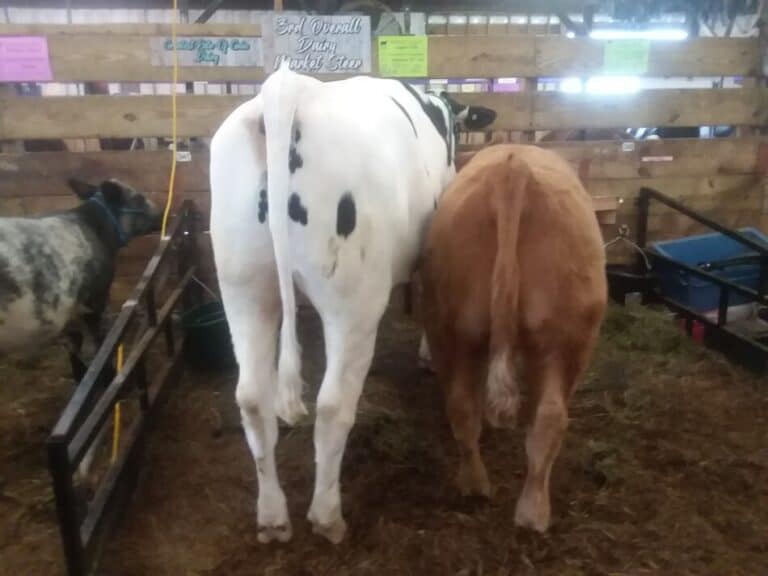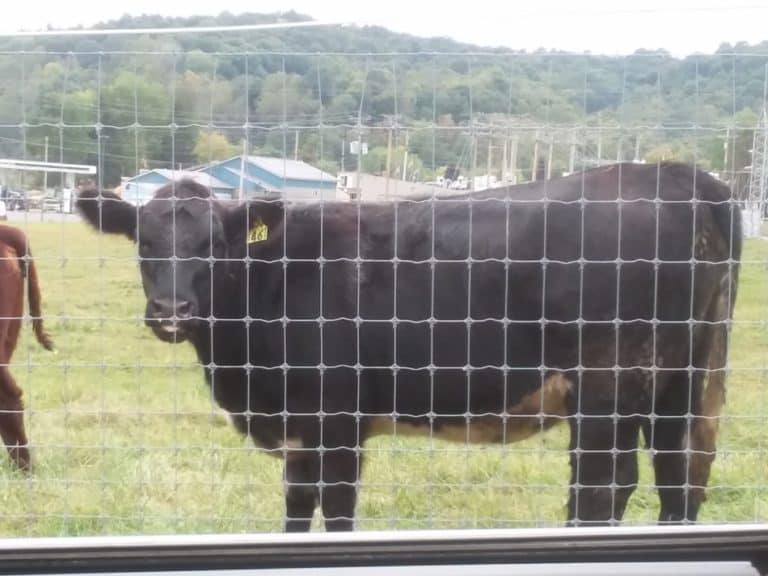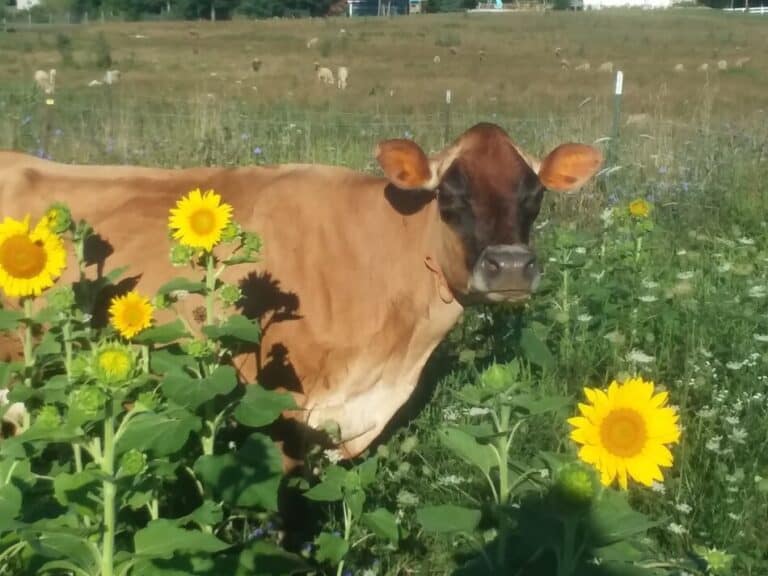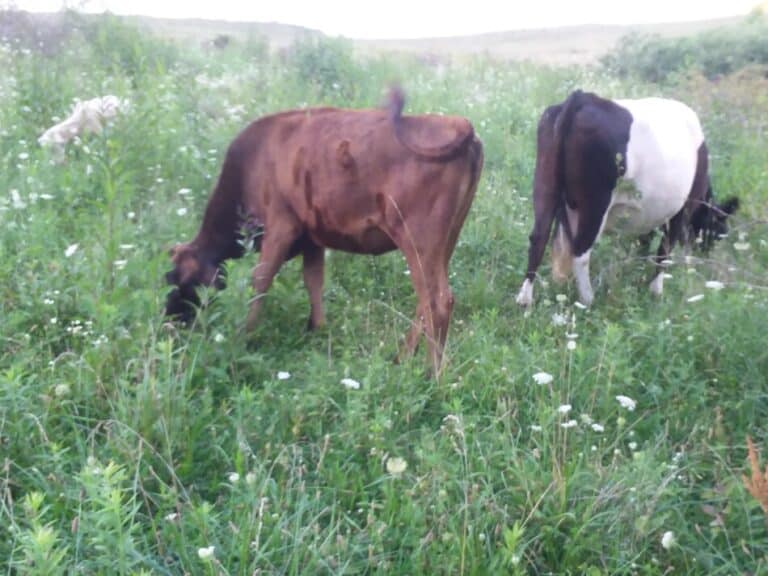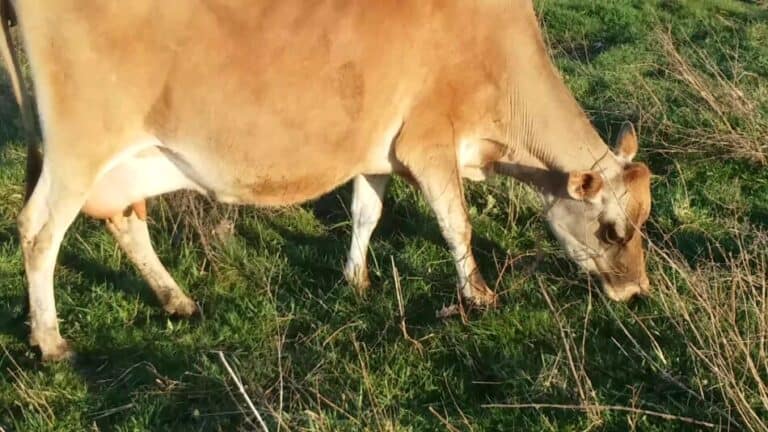Organic Beef: What Does It Mean And How Are The Cattle Raised?
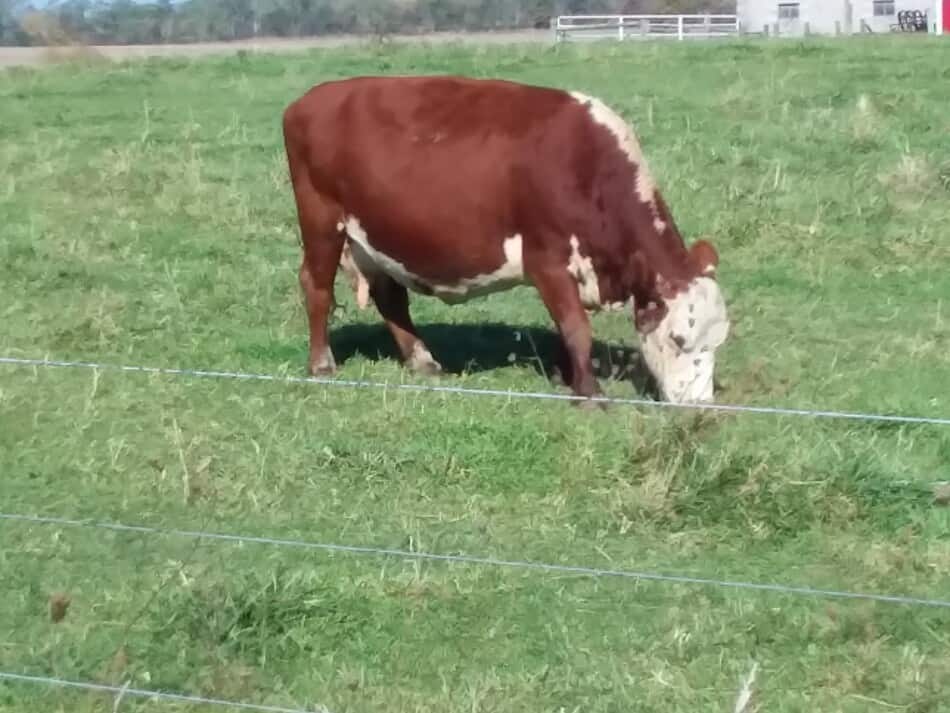
Organic beef is riding a wave of popularity. Good news, right? Maybe, maybe not. What exactly is organic beef and how are these cattle raised?
Organic beef is beef from cattle that have been raised according to the USDA organic standards.
Anytime a food, organic or otherwise, gets popular there have been large marketing campaigns put together to get you to buy the food.
Is Raising Your Own Beef Worth It? goes over the costs from feeder steer to freezer to see if you should raise your own or buy from a neighbor.
That’s okay, we have come to expect it.
The part that isn’t so expected is the potential difference between what you think you are paying for and what you are actually getting.
Looking specifically at organic beef, what are you really getting, and not getting, when you purchase organic beef?
Note: I do need to specify here, the organic beef farmer that you talk to at the local farmer’s market is a wonderful person to get your beef from! This is exactly the person worthy of your trust and your money.
It’s the corporate farms that need a second look.
Buying Beef Cattle shows you the steps to take to figure out the cattle that will work for you and where to find them.
Organic beef means fed organically
Organic beef means the cattle were raised on certified organic feed only, never given antibiotics, and treated humanely.
That’s it, don’t add any other assumptions to the raising of the beef.
How Much Beef Will Fit In My Freezer? shows you how to figure up the freezer space you need.
Organic beef does not mean that the cattle were on grass their whole lives, maybe they were, maybe they were not.
Organic beef can be raised in a feedlot, as long as the feedlot meets the organic standards.
Organic certification does not keep all organic beef cattle out of a feedlot type system. The certification just means where ever they were raised they ate organic feed.
This is where things can get a little confusing, or purposefully misleading, depending upon your outlook.
In my opinion, the organic standards are open to interpretation.
What? As I read the standards, there are multiple places where the rule can easily be bent, or just flat out ignored, repeatedly.
The organic livestock standards have to be able to be applied nation wide and cover quite a variety of weather situations.
That’s going to be a challenge. Keeping the standards high, while keeping them achievable is a balance.
Organic Beef has exceptions
Organic beef has exceptions, usually because weather can be so variable. A single instance of a crazy circumstances can happen, this is nature, after all.
An example: an unbelievably wet year when there weren’t 120 days for the cattle to go outside or they will completely ruin the pasture.
This could easily happen, as could the opposite, so dry there is nothing for the herd to eat.
In the case of the drought, the cattle could easily be outside for the 120+ days, but they won’t be getting 30% of their diet from pasture.
The grass is not there for the herd to eat because it didn’t grow!
All livestock raisers know that either of these situations, way to much rain or nowhere near enough rain, are things that could happen any year.
We certainly hope they don’t, but it’s always a possibility.
That occasional crazy year is not what I’m concerned about here.
I’m referring to the person who never puts the cows out, siting inclement weather, every day!
Repeated crazy circumstances aren’t unusual anymore, that is a pattern. This person is abusing the system and betraying your trust.
What is the difference between grass fed and Organic?
This is another point of confusion that is misleading for consumers.
Grass fed beef
Most of the cattle in the U.S. are grass fed at some point in their lives. Therefore, these cattle could be called grass fed.
They were grass fed, just not the whole time they were growing.
Having the phrase “grass fed” on the package is along the lines of using the word “natural” in regards to beef. Of course beef is natural!
To be unnatural it would have to be created in a lab or dropped off here by aliens.
These are nice sounding words meant to get your money without changing the way the cattle were treated.
Organic beef
Organic means the calf is raised organically for it’s entire life and was born to a mom that had been fed organically for at least three months before the calf was born.
She might have been fed organically for the entire pregnancy, but for sure the last three months.
An organic beef animal has been eating certified organic feed for it’s entire life. No mess ups allowed, everyday it ate organic.
This does not however mean that it was raised completely, or even partially, on pasture. This calf ate organic feed, maybe pasture, maybe not.
100% grass fed beef
If you want beef from an animal that is raised 100% on grass, then you need 100% grass fed and finished beef.
Just grass fed and finished still could be given grain to help speed up the weight gain and put on more marbling.
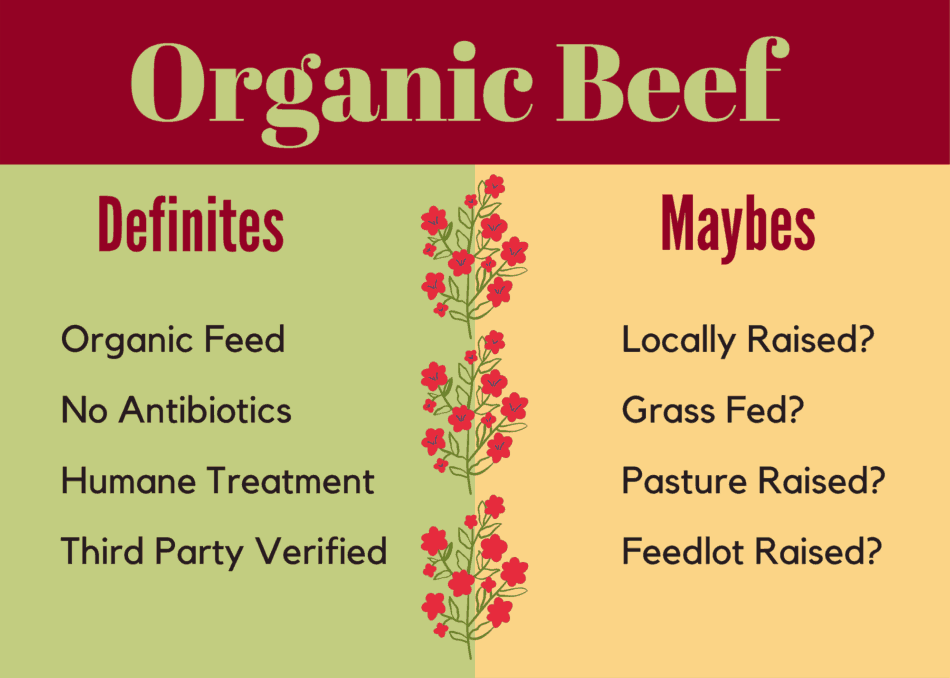
Is Organic meat better?
Really, you should be asking is organic meat better than (other meat) regarding (your concern/question)?
“Better” depends upon what you consider to be better.
What you are concerned about that made you purchase or think about purchasing organic beef in the first place?
Are you looking for meat with more flavor? Are you wanting to support the local farmers? Are you against big ag?
None of these are definitively excluded or included with organic beef.
Organic beef may not be the answer if…
Organic beef may or may not have more flavor, be local or be supported and or produced by big agri business companies.
If these are your reasons for shopping organic, think this over again. You are not getting what you think you are paying for.
Organic beef is a possible answer if…
Are you looking for non GMO, no pesticide or herbicide use and or no sub theraputic antibiotic usage? Well, now you are getting what you think you are getting.
What do Organic cows eat?
Organic cattle can only eat organically approved feeds, including grain and forages.
Fresh forages would be pasture or crops grown as forage then eaten by the cows instead of being stored.
Stored feeds would include grain, hay, haylage (fermented hay) and silage.
Any purchased feed must be certified organic and all land used to graze the cattle must also be certified organic.
Don’t forget about crop or soil amendments like fertilizers or foliar sprays.
Even though the cattle are not directly eating the fertilizer, it is being applied to plants they will eat so it must also be organic.
Is Organic beef really Organic?
It should be, since there are processes in place to ensure that if you pay for organic meat you should be getting organic meat.
But, organic is big money and that means it is potentially worth finding loopholes in the wording of the rules to exploit.
“Any time there’s a claim of a certain pedigree, an origin that the consumer is not equipped to verify independently, the market is ripe for fraud,” says Doug Moyer, PhD, a professor of public health at Michigan State University, and a researcher at MSU’s Food Fraud Institute.
Jesse Hirsch, New Food Economy.org “Iowa grain seller headed to prison”
Am I suggesting your neighbor or the gal you buy from at the farmer’s market is giving you a line? No, not even remotely.
There are many good people producing great meat organically.
If you were to head on over to the vendor’s pasture, I am sure you would see what they said you would see: happy, healthy, cattle and happy people.
What I am suggesting is that big money can attract the shameless rule benders/breakers, especially when they are not the people you are interacting with face to face.
The international grocery stores being full of organic meats that are raised in the way you are thinking they are being raised? That is not likely.
What qualifies as Organic beef?
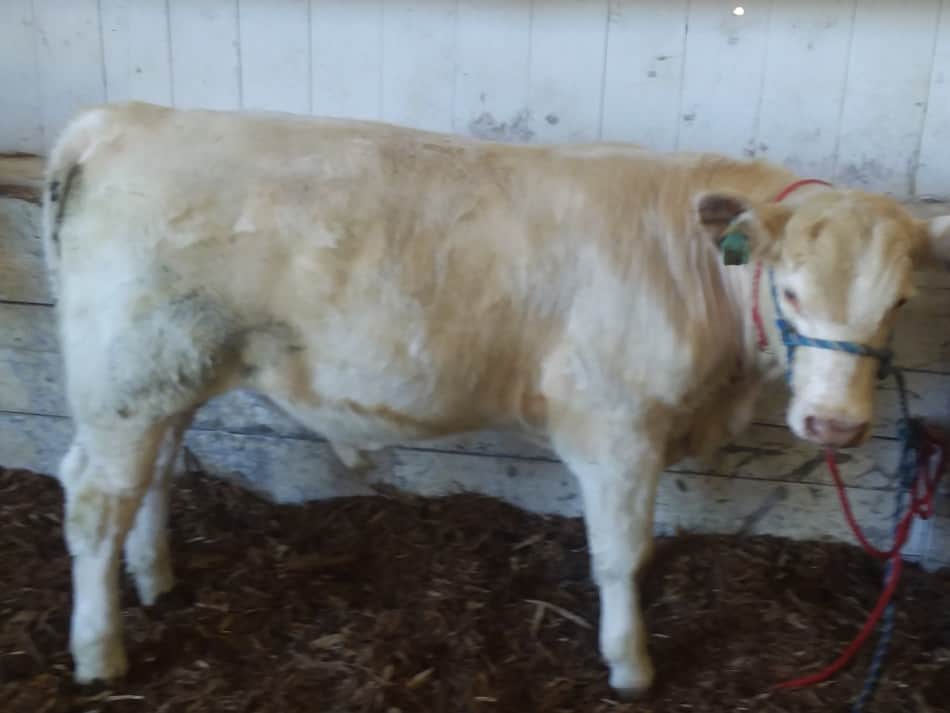
Organic beef can come from any bovine that is certified organic.
This would include cattle raised specifically for beef, as well as the beef from dairy cattle once they are no longer productive in the milking herd.
The age of the cattle is not a consideration, just the fact that the animal was raised organically.
Here is where things can get a bit confusing (again)-transitioning cattle to the organic program.
Transitioning to Organic
If a farmer wants to take her cattle and transition them to organic she can, no matter what the cattle have been eating previously.
The transition period is for one year. meaning the cattle have to be eating 100% organically approved diets before they are able to be called organic.
If the brood cow, was raised conventionally (not organic) she can give birth to organic calves if she was eating an organic diet for the last 3 months of gestation.
However, since she was born and raised in a conventional system, she is not organic herself. Meaning when her productive life is over she is regular beef, not organic beef.
Cattle raised organically their entire life
Her calf is organic from the day it is born and can be sold for organic beef.
If you were to buy this organic calf and raise it non organically it would no longer qualify to be sold as organic beef.
The feed and farming system must be in compliance with the organic standards for the entire life of the calf in order for this calf to be sold for organic beef.
As far as the feeding of the organic beef animal, the calf is to be raised on organic feed for it’s entire life and is to be getting 30% or more of his diet from grass.
The grazing period for the year is to be at least 120 days long and the cattle are to be out eating grass anytime the weather permits.
Finishing Organic beef
The beef calf can be finished on grain for the last 1/5th of his life.
This means he does not have to be eating grass (at the 30% level, or any at grass at all) for the last 120 days before he is slaughtered.
Is it worth buying Organic beef?
The worth of anything depends upon the value it has to you. What are you looking for or looking to gain or avoid by purchasing organic beef?
Example 1: If you are looking to eliminate GMO’s from your diet and the diet of the animals you eat, then organic beef will is a great choice.
Organically raised livestock can not be fed GMO’s so organic beef would likely* give you a GMO free meat.
Example 2: If you are looking for cattle that are raised on grass until they reach butchering weight, then no.
Organically raised beef can be finished (fattened up) on grain, with no time on pasture for the last 120 days. In this case you would not be getting what you are wanting for your money.
*The asterisk on the word likely is because there have been breaches in the system regarding organic grain, specifically a grain broker selling conventional grain as organic.
Click here for a link to one of many articles on non organic grain being sold as organic, or just search “non organic grain sold as organic” (that’s what I did).
Be prepared, this is an eye opener, for sure.
Is Organic beef the same as free range?
No. Free range is a term normally used for poultry, such as chickens or ducks.
For cattle, you need to be looking for 100% pasture raised and finished, if you want beef from an animal that was on pasture his whole life and wasn’t finished on grain, only forages.
The term pasture raised could be for the whole life of the calf or just part of his life, meaning he was on pasture when he was young only.
You should be aware that pasture raised could actually apply to the vast majority of cattle in the U.S.
Most beef calves are born on pasture and raised with their moms on pasture or range, until they are weaned (old enough to not need their mom anymore).
As an example: a calf that lived with his mom for the first 6-8 months of his life then is sold as a stocker to a feedlot is technically pasture raised.
Most people that want grass fed beef, or “free range” beef would need to buy 100% grass fed and finished beef.
If you want beef from cattle fed only grass or other forages, this is the only labeled beef option I know of that will meet your expectations regarding how the animal was raised.
All of the other labels leave grain feeding as an option.
Can Organic beef factory farmed?
Sadly, yes, organic beef can be factory farmed. Is it normally factory farmed? Not that I am aware of, but it is definitely possible.
Organic beef just needs to be fed organic feed and not given antibiotics, notice the absence of operation size specifics.
I just searched online for to find the percent of organic beef that is produced by small farms and came up empty.
This is a piece of information I would like to have! Odd that this number is not easily found, especially since the certifications all run through the USDA.
Do the cattle have to be kept on grass?
None of the regulations speak to keeping the animal on grass.
Even the rules that list a certain percentage of the diet having to come from fresh pasture grasses does not mean the cattle were out on grass.
This grass can easily be cut and brought to the cattle as green chop.
Green chop is common in situations where the grass is grown somewhere different from where the cattle are living, so it is mechanically harvested and brought to the cattle.
The grass is fresh but the cattle did not go to the grass, it came to them.
Is Organic beef antibiotic free?
Yes, Organic beef is antibiotic free. No antibiotics are permitted in Organic livestock production. This is a standard that has no exceptions.
If an animal needs to be given antibiotics, it must be removed from the certification program.
The animal can still be sold as beef (once the withdrawl period is over) but no longer as Organic beef.
Does Organic mean non GMO?
Organic means no GMO’s are permitted in the feed of the cattle or in the plants, like corn or hay, grown to feed the cattle.
Conventional farmers (non Organic) can grow all of the same crops and forages as an Organic farmer. Don’t let that throw you.
The difference is in the seed selected and the methods used to grow the crop. Any crop that can be grown organically is being grown conventionally and vice versa.
Can Organic farmers use vaccinations?
Organic farmers can use vaccinations for their cattle. The vaccines used are the same for both Organic and non organically raised cattle.
How to get certified for raising Organic beef?
In our area, Ohio, the most popular certification organization is OEFFA Ohio Ecological Food And Farm Association. Click here for a link to their website.
Can the seller say Organic if he is not certified Organic?
Generally speaking, no, a seller can only use the word “Organic” if she is certified as Organic. However, there are exceptions.
In Ohio, a small producer can use the word Organic without being certified if she is producing the beef according to all of the Organic standards and is selling less than a total of $5,000 worth of beef.
Once the yearly sales go up to $5,000 then she must be certified to say that the meat is Organic.
My take on the reason for the mandatory certification starting at $5,000 is that certification is the same price for any size operation.
This allows a person selling a small amount of Organic produce or meat to get involved in Organic farming with out having a huge fee for selling a few hundred dollars worth of flowers or produce.
The certification cost of $900-1,350 depends upon where you live and when you apply for certification.
$900 is a big chunk out of the overall income for a small producer.
At $5,000 sales the cost of certification would be 18% (27% if you had to pay the higher fee) of the income.
What are the Organic livestock standards, according to the USDA?
Organic means that the animal was raised according to a certain set of standards that are listed out by the USDA Organic Livestock Requirements.
Here are some of the highlights regarding the management of organically raised animals (USDA sourced):
- No Genetic Engineering (GMO’s), radiation or sludge used on the farm
- Managed to conserve natural resources and biodiversity
- Abide by National List (list of approved and prohibited substances)
- Overseen by certifying agent who meets USDA regulations
Standards for the animals themselves:
- Brood cow (mom) managed organically for last 1/3 of gestation or from second day after hatching for poultry
- Year round access to outdoors (exceptions below)
- Raised on certified organic land
- Raised according to animal health and welfare standards
Standards for the living area of the animals (the items listed below are directly quoted from the USDA Organic Livestock Requirements):
- Access to the outdoors
- Shade
- Clean, dry bedding
- Shelter
- Space to exercise
- Fresh air
- Clean drinking water
- Direct sunlight
Standards for the pasture:
- 30% diet from organic certified pasture
- The balance of feed must be also certified organic
- 120 day grazing minimum
- Ruminants must have access to pasture except under specified conditions (inclement weather and last 120 days of life for slaughter beef)
Standards for treatment options:
- No antibiotics
- Pain medication is allowed
- Dewormers are allowed
- Vaccinations are allowed
Resources: USDA Organic Livestock Requirements, Ohio Ecological Food And Farms (OEFFA) website
